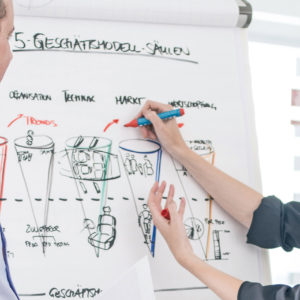
Shortened technology and product life cycles are increasingly forcing companies to launch new products and services on the market at short intervals. In this context, dealing with innovations is a key success factor. However, systematically generating ideas and quickly filtering out the right ones from many ideas in a structured manner and implementing them is a critical process with serious consequences. However, there are extensive instruments and methods of "systematic innovation" that can provide essential support for this process. The Innovation Management degree program has a high level of expertise and experience in providing in-service training in this specialist discipline. Based on this expertise and the close contact with industry, special qualification measures were carried out together with the corporate partners ZETA Biotechnik GmbH, STARMANN Metallbau GmbH and AT&S Austria Technologie &Systemtechnik AG, which covered the qualification of the companies by expanding the skills of the employees of the respective engineering core team in the areas of creativity technology and TRIZ. The aim of this qualification measure was to impart practice-oriented skills in the implementation of innovations for the respective team of specialists with a technological background. By qualifying key employees, the companies were enabled to generate appropriate projects and ideas for solving problems more quickly, to systematically evaluate and prioritize them and to implement them consistently and more quickly. The qualification program was specially tailored to the needs of technology-oriented companies and also included a stronger practical focus in the form of supervised project work. The employees were trained in the methods and instruments of systematic innovation in three training stages. The training stages were "Special creativity techniques for technological developments" and two separate blocks on "Systematic innovation for technological developments" for didactic and economic reasons. A concrete and supervised practical project from the respective company was integrated into the final training stage. This made it possible to anchor the knowledge in the companies in a sustainable and practical way and represented an additional benefit of the project for the company partners. The knowledge gained in the area of special creativity techniques and "systematic innovation" techniques now makes it possible to respond even more effectively and quickly to customer requirements and develop special high-tech solutions. The mix of participants from different companies was also a particular added value. This made it possible to learn not only from the trainers themselves, but also from the other participants through the exchange of best practice.